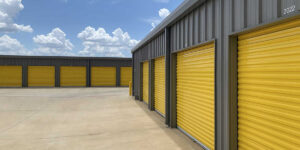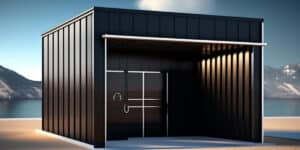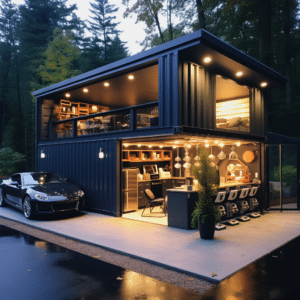Introduction to Shipping Container Workshops
In the realm of DIY spaces and home workshops, an emerging trend is turning heads and sparking interest. We’re talking about shipping container workshops.
What is a Shipping Container Workshop?
A shipping container workshop is precisely what it sounds like. It’s a workshop space created from a repurposed shipping container. These containers are the same ones you see on freight ships, in ports, and on the back of semi-trucks. They are designed to withstand harsh weather conditions and heavy loads, making them an excellent choice for a workshop space.
The beauty of a shipping container workshop lies in its simplicity. The basic structure is already there, ready to be customized according to your needs. Whether you’re a woodworker, a mechanic, or an artist, a shipping container can be transformed into a functional and organized workshop. Interested in seeing some examples? Check out our collection of container garage ideas.
Why Choose a Shipping Container for Your Workshop?
The reason for the rising popularity of shipping container workshops is their long list of benefits. They are durable, versatile, and cost-effective. Plus, they offer a unique aesthetic that you just can’t get with a traditional garage or shed.
Firstly, shipping containers are built to last. They are made of sturdy, corrugated steel and can withstand harsh weather conditions. This durability means a shipping container workshop will be a long-term investment that can serve you for many years to come.
Secondly, shipping containers are incredibly versatile. They can be modified in countless ways to suit your specific needs. Want a workshop with large windows for natural light? How about built-in storage for your tools? Or maybe you need a space that can double as a garage for your vehicle? A shipping container can be all of these and more. Check out our container garage plans for inspiration.
Finally, compared to building a workshop from scratch, a shipping container can be a more cost-effective option. While the initial cost of the container can vary depending on its size and condition, the overall cost of transforming it into a workshop can be significantly less than constructing a new building.
In conclusion, a shipping container workshop can offer a unique, durable, and customizable space for all your DIY projects. So why not think outside the box (or in this case, within the box) for your next workshop?
Benefits of a Shipping Container Workshop
When it comes to building a workshop, a shipping container workshop presents a unique and innovative option. These workshops hold several advantages, including exceptional durability, flexibility, and cost-effectiveness.
Durability and Strength
A key benefit of a shipping container workshop is its remarkable durability. Designed to endure harsh weather conditions during sea transport, shipping containers are made from weathering steel, also known as Cor-Ten steel. This material is known for its resistance to weather conditions and its structural strength, making it an excellent choice for a workshop that can withstand various elements.
Moreover, shipping containers typically have a lifespan of 25 years or more, ensuring that your workshop will stand the test of time. This long-lasting durability makes them a superior choice compared to traditional wood or brick structures.
Flexibility and Customizability
Shipping containers offer incredible flexibility and customizability. With a shipping container, you have the freedom to design your workshop according to your specific needs and preferences. This could include adding windows for natural light, partitioning the interior into separate work areas, or incorporating shelving units for storage.
You can even stack multiple containers to create a multi-level workshop. The possibilities are virtually endless, allowing you to create a workspace that truly reflects your personal style and requirements. For more ideas on how to customize your shipping container workshop, check out our article on container garage ideas.
Cost Effectiveness
When it comes to cost, a shipping container workshop is a cost-effective solution compared to traditional workshop structures. The initial cost of purchasing a used shipping container is relatively low, and the modifications necessary to transform it into a workshop can be done gradually as your budget allows.
In addition, the maintenance costs are generally low due to the durability of the container. This means you’ll save money in the long run on repairs and replacements. For a more detailed breakdown of the costs associated with a shipping container workshop, visit our article on container garage cost.
In summary, a shipping container workshop offers a durable, flexible, and cost-effective solution for your workspace needs. Whether you’re a hobbyist or a professional craftsman, a shipping container can provide the perfect space to work on your projects while adding a unique touch to your property.
Transforming a Shipping Container Into a Workshop
Creating a shipping container workshop is an exciting project that presents a unique set of opportunities and challenges. The process involves selecting the right container, planning the layout, and making necessary modifications.
Selecting the Right Container
The first step in creating a shipping container workshop is to select the right container. The choice of container will depend on several factors, including the intended use of the workshop, the available space, and the budget. Standard shipping containers come in two sizes: 20 feet and 40 feet. However, other sizes are also available, offering more flexibility in terms of space and layout.
When choosing a container, consider the condition of the container. New containers are often more expensive, but they are in excellent condition and require fewer repairs. Used containers are more affordable, but they might need some repair work. Visit our article on container garage for sale for more information.
Planning the Layout
Once you have selected the right container, the next step is planning the layout of your workshop. Consider the type of work you will be doing in the workshop and the amount of space you will need. You may want to include space for workbenches, storage, and even a small office area.
Consider where you will place doors and windows for easy access and natural light. Remember to plan for electrical outlets and lighting fixtures. You may also want to consider adding insulation, ventilation, and heating or cooling systems for comfort. Check out our article on container garage plans for layout ideas.
Necessary Modifications
Transforming a shipping container into a workshop requires some modifications. These can include cutting openings for doors and windows, installing electrical and plumbing systems, adding insulation, and painting the interior and exterior of the container.
When making these modifications, it’s important to follow building codes and regulations in your area. You may need to hire professionals for some of the tasks, especially for electrical and plumbing work. Visit our article on container garage construction for more information on the modification process.
By carefully selecting the right container, planning your layout, and making necessary modifications, you can create a functional and efficient shipping container workshop that meets your specific needs. Whether you’re a DIY enthusiast or a professional, a shipping container workshop provides a durable, flexible, and cost-effective solution for your workspace needs.
Using a Shipping Container as a Garage
A shipping container workshop can also be utilized as a garage, providing an innovative solution for storing vehicles, equipment, and tools. It’s an option that offers homeowners a unique blend of practicality and customization.
Advantages of a Shipping Container Garage
A shipping container garage comes with several advantages that make it a viable alternative to traditional garages.
-
Durability: Shipping containers are designed to withstand harsh weather conditions, ensuring that your garage will last for many years with minimal maintenance.
-
Security: The robust design of shipping containers provides a high level of security, protecting your vehicles and equipment from theft and vandalism.
-
Portability: Shipping containers can be easily relocated, giving you the flexibility to move your garage as needed.
-
Customizability: With a shipping container, you have the freedom to design your garage according to your specific needs. You can add windows, doors, insulation, and more, to create a fully functional garage.
For more detailed insights into the benefits, check out our article on shipping container garages.
Designing a Shipping Container Garage
When it comes to designing your shipping container garage, there are a few key considerations to keep in mind.
Size: Depending on your requirements, you can choose from various container sizes. Standard shipping containers often come in lengths of 20ft or 40ft, but there are also high-cube options that offer extra height. You can check out our guide on container garage dimensions for more information.
Layout: The layout of your garage will depend on its intended use. If you’re planning to use it for vehicle storage, a simple open plan might suffice. However, if you plan to include a workshop area, you might want to consider a partition or designated space. Explore container garage with workshop for creative layout ideas.
Modifications: Depending on your needs, you may want to make certain modifications to your shipping container garage. This could include adding ventilation, insulation, windows, or doors, or even installing plumbing or electricity. Visit container garage with electricity to learn more about possible modifications.
Planning and designing your shipping container garage can be a fun and rewarding process. With some creativity and careful planning, you can create a garage that not only meets your storage needs but also reflects your unique style and personality. For more design inspiration, check out our collection of container garage ideas.
Ensuring Safety and Comfort in Your Shipping Container Workshop
Once you’ve got your shipping container workshop set up, you’ll want to ensure it’s a safe and comfortable place to work. This means thinking about insulation and temperature control, ventilation and lighting, and security measures.
Insulation and Temperature Control
Shipping containers can get pretty hot or cold depending on the weather, so it’s crucial to insulate them properly. This will not only make your workshop more comfortable but also protect your tools and materials from temperature fluctuations.
There are several options for insulating a shipping container, from spray foam to insulated panels. The best option will depend on your budget and the climate where you live. To help control the temperature further, consider adding a heating and cooling system. These can range from portable heaters and fans to more elaborate HVAC systems. To find out more about insulating a shipping container, see our article on container garage with insulation.
Ventilation and Lighting
Good ventilation is essential in a shipping container workshop. It can help control temperature, reduce humidity (which could lead to rust), and keep the air fresh and safe to breathe. Ventilation can be as simple as opening the doors and windows or installing vents or fans.
Proper lighting is also important for safety and usability. Natural light can be incorporated through windows or skylights, and artificial lighting can range from basic overhead fixtures to task lighting in specific work areas. For more tips on these aspects, check out our articles on container garage with windows, container garage with skylights, and container garage with ventilation.
Security Measures
Security is another crucial factor. Depending on what you’re storing in your workshop, you may want to consider a lockable door, security bars on windows, an alarm system, or even CCTV.
Additionally, consider the safety of the tools and machinery you’re using in your workshop. Make sure they’re well-maintained and that you’re using them in a safe and appropriate manner. Remember, your workshop should be a space that inspires creativity and productivity, not hazards and risks.
In all, making your shipping container workshop safe and comfortable is about more than just convenience. It’s about creating a space where you can work effectively and enjoyably. With the right insulation, lighting, ventilation, and security, your shipping container can become the perfect workshop for all your DIY projects.





